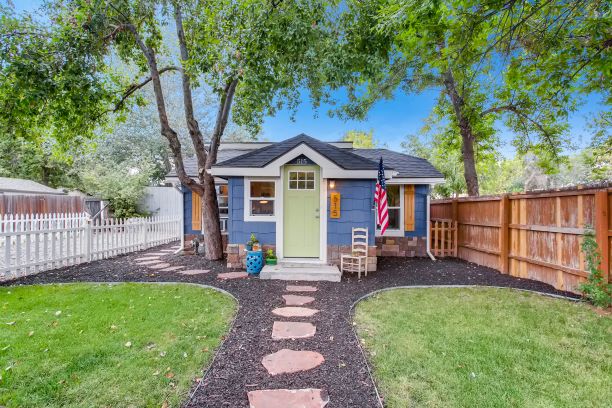Social Links Widget
Click here to edit the Social Media Links settings. This text will not be visible on the front end.
Buying and Selling a Home at the Same Time

Successfully selling a home and buying a home are significant accomplishments on their own, but when their timelines cross it can be difficult to manage both. If you’re thinking about doing both simultaneously, it’s equally important to understand the steps you can take to make the process go smoothly as it is to have a backup plan in case it doesn’t. Above all, the balancing act required to pull off both deals highlights the importance of working closely with a trusted and experienced real estate agent.
Do I buy or sell first?
One can imagine a perfect world in which the two transactions go through one right after the other. However, this is not usually the case. So, should you list your current home first or start by putting in offers on a new one? There are pros and cons to both.
Selling your current home first allows you to make offers on a new home with cash in your pocket, increases your buying power, and avoids having to juggle two mortgages simultaneously. On the other hand, it creates a gap of residence, often leaving homeowners wondering where they’ll stay until they move into their new home or whether they may need to rent before they can buy again. Sellers may also negotiate a rent-back agreement with the buyers, allowing them to rent the house from the new owners before they move in.
Buying before selling solves the need for any temporary housing and makes the overall moving process much easier. Having a residence established ahead of time means you’ll only have to move once, which can save you some serious stress during this time of transition. Oppositely, buying a new home before you sell your current one will put an added strain on your finances. Having two concurrent mortgages equates to taking on more debt, which could result in less-than-favorable loan terms for purchasing your new home. Without the lump sum generated by a home sale in your pocket, coming up with enough money for a down payment may be a challenge and obtaining private mortgage insurance (PMI) may be in the cards. Finally, buying before selling comes with an obvious assumption—that your current house will sell.
Ultimately, the order of operations depends on your situation. Perhaps you’re moving due to a change of employment, and you need to direct all your energy toward buying a new home by a certain date before you can even think about selling your current one. No matter which route you take, it’s important to communicate your timeline to your listing agent or your buyer’s agent so they can strategize accordingly.
Buying and Selling a Home at the Same Time
Local Market Conditions
Buying and selling at the same time will come with a certain duality: at each step in the process, you’ll have to balance your responsibilities as both a buyer and a seller. For example, when assessing your local market conditions, you’ll be looking at not one, but two housing markets.
- Seller’s Market: Selling in a seller’s market means that that you’ll need to be prepared to move once you list, since you could be looking at a short selling timeline. However, relying too heavily on the assumption that your house will sell quickly could make things dicey down the road. If you’re buying in a seller’s market, finding a new home may take longer than expected. You could potentially be waiting weeks or months for an offer to get accepted.
- Buyer’s Market: Selling in a buyer’s market typically means that homes stay on the market longer. If you proceed with a new home purchase just after you’ve listed your current house, know that it may take a while to sell. If you’re buying in a buyer’s market you can afford to be picky, knowing that time is on your side. With fewer people buying homes, sellers will be more flexible, giving you leverage to negotiate your contingencies.
Having a Backup Plan
If only you could wave a magic wand and make both transactions go through as planned. That’s why it’s important to have a backup plan in place to right the ship should things go sideways at any point in the buying or selling process. Talk to your agent about which options may be right for you. Here are a few:
- Sales Contingency: Buying your new home with a sales contingency allows you to opt out of the purchase contract if your home doesn’t sell by a specified date. Purchasing contingent on the sale is rare in highly competitive markets.
- Bridge Loan: If your current home hasn’t sold yet and you’re not able to afford the down payment on a new home, a bridge loan may be a fitting solution. Bridge loans can be used to cover the down payment on a new house and are repaid once your existing home has sold.
- Rent-Back Agreement: A rent-back agreement is a clause in the sales contract that allows the seller to rent their old home from the buyer for an agreed-upon period of time before the buyer moves in. This can be especially helpful in situations when the seller is having trouble finding a new home.
For more information on buying and selling a home at the same time, give us a call at (970) 460-4303 to get connected with an experienced agent!
Buyer Beware: Is That House For Sale Haunted?


A trope as old as horror movies: a family moves into a beautiful house that they bought for well under market value. They’ve put all their savings into the move, and they’re looking for a fresh start. When they meet the neighbors and other townsfolk, they quickly learn that there’s a history to the home that they weren’t aware of.
When they start to experience the abnormal, it’s easy to brush off as new home jitters. The children who hear noises in the closet, and a husband who starts sleepwalking, are chalked up to stress and anxiety from the move. It’s only when the experiences escalate beyond control that the family finally realizes the extent of the haunting.
While sharing a home with the supernatural can be a selling point for some buyers, it’s quite the opposite for others. In fact, a 2017 survey by Realtor.com found that 33% of people were open to living in a haunted house, 25% would consider it, but 42% said it was a deal-breaker. So how do you make sure you’re fully informed about a home’s history? Knowing the right questions to ask is the first step:
Ask to see the seller disclosure form
In the famous 1991 case Stambovsky v. Ackley, the new homeowner, Jeffrey Stambovsky, won a lawsuit against the previous owner for not disclosing the history of hauntings.
In this case, the previous owner had published stories about the family’s experiences in Reader’s Digest and their local newspaper. In her writings, she explained several interactions with ghostly beings in the home, including finding that her children had been given rings, which would later disappear, bed shaking, and conversations with the floating specters.
The court took this evidence and ruled the “defendant is estopped to deny [the ghost’s] existence and, as a matter of law, the house is haunted.” Setting a new standard, this case created a basis for future seller disclosers. In this instance, they found that the history of the home, and the seller’s experiences in the home, would have influenced the marketability, and therefore, omitting these facts was unfair to the buyer.
Fast forward to 2019, there is not a specific section on seller disclosure forms for hauntings or ghostly sightings, but thanks to Stambovsky v. Ackley, sellers in many states are obligated by law to disclose things that affect a house’s marketability.
Ask Google about the history of the home
In 1991 when Mr. Stambovsky bought his haunted house, search engines didn’t exist. Today, we’re lucky enough to have things like Google which would have found the previous home owner’s stories in mere seconds. Search keywords like the address or town name, and words like “haunted” or “ghosts”, as well as “murder” or “news report” should help you start your dive into the history of the home.
Ask the neighbors and your agent
This is where nosey neighbors come in handy. When you find a place you’re serious about, contact the neighbors to see what they know about the home’s history. The same goes for your real estate agent; he or she can reach out to the listing agent to see if there is anything haunting you should know about prior to buying. While many states don’t require sellers to disclose paranormal activity or deaths in the home, if asked, all real estate agents must, by law, answer truthfully.
Charming Bungalow in Eaton

This sweet bungalow at 420 Park Ave located in picturesque Eaton! Much updating has already been done, with fresh paint and newly refinished original hardwoods in living room and front bedroom. All new quality stainless appliances await a kitchen update which has already been started. Storage is abundant with vintage built-ins in the converted entry/office and cabinets in the mudroom and enclosed porch. Great landscaping with alley access, no HOA! Treasure the joy of old town living at an affordable price! Contact Casey Brown for more information or click below to view the photos and details, including price.
Charming Home in the Heart of Fort Collins

10 Key Qualities to Look for When Selecting an Agent


Buying a home is one of the most significant financial and emotional purchases of a person’s life. That’s why it is so important to find an agent that can not only help you navigate the home search process but one who can also answer your questions and represent your needs from start to finish. Most importantly, your agent should care about your happiness and ensuring that you find the home that best fits your needs.
Here are some qualities to consider when selecting a real estate agent:
- Likable. More than likely, you will be spending a lot of time with your agent, so look for someone that you enjoy interacting with.
- Trustworthy. One of the best ways to find an agent who you feel you can trust is to ask friends and family for a referral. Another way to do this is to interview different agents and ask for client references.
- Effective listener. While your agent can’t read your mind, they should be able to make educated recommendations and offer advice by listening closely to your needs. Make sure you talk to your agent about your priorities, what types of features appeal to you, as well as any factors that could be deal breakers. This will arm your agent with everything they need to help find you the perfect home.
- Qualified and experienced. Make sure your agent has the qualifications and experience to meet your specific needs. For example, some agents have more experience with short sales, while others might be experts on certain neighborhoods or types of housing. Your agent should also be fully trained in contract law and negotiations.
- Knowledgeable. A great agent is someone who is out in the neighborhoods, exploring communities, visiting listings, performing marketing analyses, and collecting all the information that you need to make an informed, confident decision about your real estate needs.
- Honest. Your agent should be upfront and honest with you about every aspect of your home search process – even if it involves delivering bad news. The best real estate agents are more concerned about finding the right home for their clients, not just the home that brings in the fastest commission check.
- Local. Every community is different and all real estate is local, so it’s important to find someone who really knows the local market and can provide you with whatever information you need to familiarize yourself with a particular area.
- Connected. A well-connected agent will have relationships with lenders, inspectors, appraisers, contractors, and any other service provider you might need during your home search.
- Straightforward. You want an agent who will work hard to help you find the best home, but you also want someone who will be straightforward with you about the process, the market reality, and what is realistic for you.
- Committed. Your agent should be in it for the long haul, meaning that they’re looking out for your best interests every step of the way, no matter how long the process takes. The best way to find an agent with these qualities is by asking around. In all likelihood, someone within your circle of friends or family will have experiences to share and professionals to recommend. You can also search for agents based on area, so you know you’re getting someone who is knowledgeable about the neighborhood(s) you’re interested in.
5 Deal Breakers that can blindside home buyers

 Purchasing a home can be a complex endeavor for even the most well prepared home buyer. You’ve diligently saved for your down payment, followed the market, researched agents and now you are ready to make an offer on your dream home. Don’t let these 5 “Deal Breakers” come between you and your new home.
Purchasing a home can be a complex endeavor for even the most well prepared home buyer. You’ve diligently saved for your down payment, followed the market, researched agents and now you are ready to make an offer on your dream home. Don’t let these 5 “Deal Breakers” come between you and your new home.
- Big Purchases on Credit. It is tempting to buy the furniture for your new home or a new car for the garage before the sale closes. Take care if you are making these purchases on credit. Large purchases on credit can have a major impact on your credit profile which effects your mortgage application. It’s a better plan to wait until after closing or pay cash for these transactions or you may be putting that furniture in a different living room than you originally picked them out for.
- Overpaying. Before your bank will approve your mortgage they will appraise the home you are purchasing. If they feel you are overpaying they are likely to decline your mortgage application. If you find yourself in this situation consult with your agent on renegotiating your offer to be more in line with the bank’s appraised value.
- Purchasing too close to Foreclosure. If you are making an offer on a house which is facing foreclosure be sure to have a closing date set before the foreclosure date. Have your agent work with the lender to structure closing before the house goes back to the bank and into foreclosure.
- IRS liens. You’ve heard the old saying “Death and Taxes”. Back taxes and liens can derail your attempts to get financing for a mortgage so be sure to have your books in order before filing your loan application.
- Comprehensive Loss Underwriting Exchange (CLUE). CLUE is a data base of insurance claims for both people and property. Your home insurance rates are determined by the information about you and the property you plan to purchase which is contained in this report. Past claims for water damage, falling trees and even dog bites from present and past owners can multiply your insurance rates. Consult your agent about the CLUE report for your future home as soon as possible once your home purchase offer is accepted.
When purchasing a home there will be challenges which you can plan for and the unexpected hurdles. By educating yourself as a consumer and choosing a well trained real estate agent you can avoid many of the pitfalls of 21st century home ownership.
What about you? Tell us if you have had any “deal breaker” experiences.
Top 10 qualities to look for in an agent


Buying a home is one of the most significant financial and emotional purchases of a person’s life. That’s why it is so important to find an agent that can not only help you navigate the home search process, but one who can also answer your questions and represent your needs from start to finish. Most importantly, your agent should care about your happiness and ensuring that you find the home that best fits your needs. Here are some qualities to consider when selecting a real estate agent:
- Someone you like. More than likely, you will be spending a lot of time with your agent, so look for someone that you enjoy interacting with.
- Someone you trust. One of the best ways to find an agent who you feel you can trust is to ask friends and family for a referral. Another way to do this is to interview different agents and ask for client references.
- Someone who listens. While your agent can’t read your mind, they should be able to make educated recommendations and offer advice by listening closely to your needs. Make sure you talk to your agent about your priorities, what types of features appeal to you, as well as any factors that could be deal breakers. This will arm your agent with everything they need to help find you the perfect home.
- Qualified and experienced. Make sure your agent has the qualifications and experience to meet your specific needs. For example, some agents have more experience with short sales, while others might be experts on certain neighborhoods or types of housing. Your agent should also be fully trained in contract law and negotiations.
- Knowledgeable. A great agent is someone who is out in the neighborhoods, exploring communities, visiting listings, performing marketing analyses, and collecting all the information that you need to make an informed, confident decision about your real estate needs.
- Honest. Your agent should be upfront and honest with you about every aspect of your home search process – even if it involves delivering bad news. The best real estate agents are more concerned about finding the right home for their clients, not just the home that brings in the fastest commission check.
- Local. Every community is different and all real estate is local, so it’s important to find someone who really knows the local market and can provide you with whatever information you need to familiarize yourself with a particular area..
- Connected. A well connected agent will have relationships with lenders, inspectors, appraisers, contractors, and any other service provider you might need during your home search.
- Straight forward. You want an agent who will work hard to help you find the best home, but you also want someone who will be straight forward with you about the process, the market reality, and what is realistic for you.
- Committed. Your agent should be in it for the long haul, meaning that they’re looking out for your best interests every step of the way, no matter how long the process takes. The best way to find an agent with these qualities is by asking around. In all likelihood, someone within your circle of friends or family will have experiences to share and professionals to recommend. You can also search for agents based on area, so you know you’re getting someone who is knowledgeable of the neighborhood(s) you’re interested in.
 Facebook
Facebook
 Twitter
Twitter
 Pinterest
Pinterest
 Copy Link
Copy Link